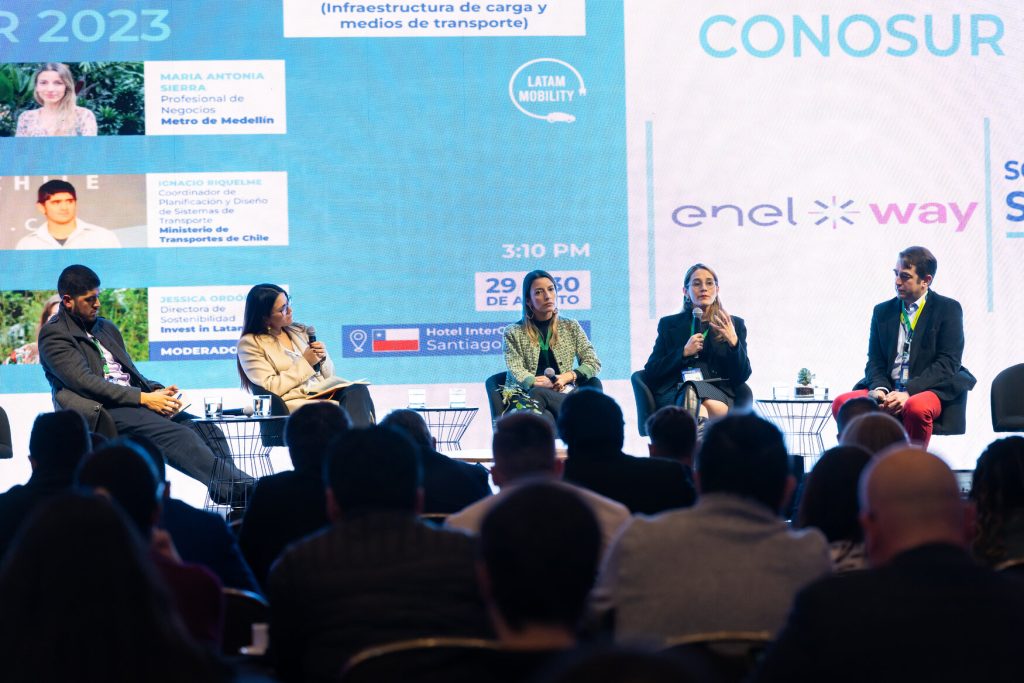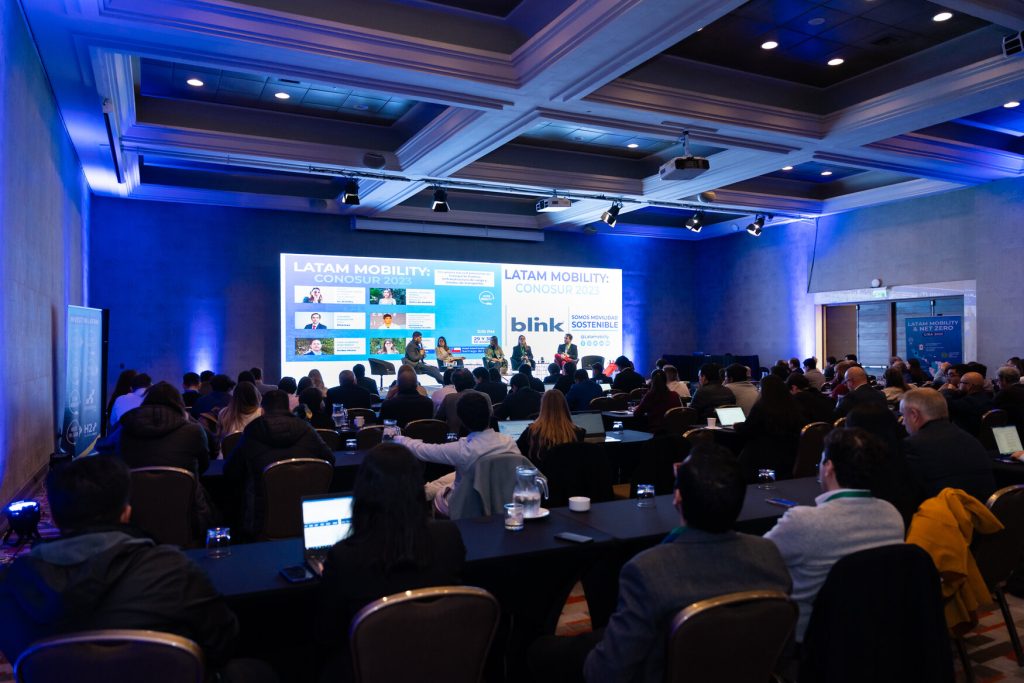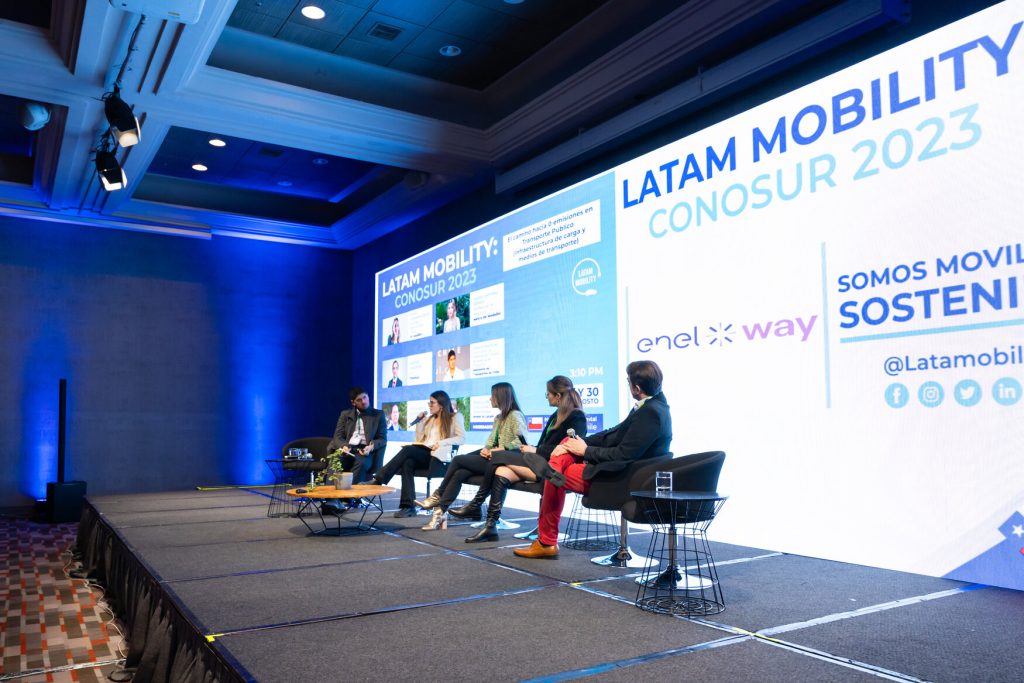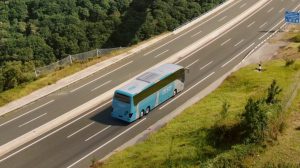The progress towards the electrification of mass transportation is a hot topic in Latin American cities, as a significant number of people move by different means, and was a topic that was addressed in the panel “The Road to Zero Emissions in Public Transportation“, during the meeting “Latam Mobility: ConoSur 2023“, held in the city of Santiago de Chile.
The panel included the participation of Andrés Barentin, CEO of Dhemax; Maria Antonia Sierra, Business Professional of Metro de Medellin; Maria Fernanda Ortiz, Business Development Officer of VG Mobility, and Ignacio Riquelme, Planning and Design Coordinator of Transportation Systems of the Ministry of Transport and Telecommunications of Chile, under the moderation of Jessica Ordoñez Miranda, Sustainability Director of Invest in Latam.
You may also be interested in: Andes Motor, BYD Chile and Voltera Analyze Technological Advances in Sustainable Mobility
Universal Access
The representative of Chile’s Ministry of Transport and Telecommunications, Ignacio Riquelme, pointed out that the institution has a significant number of initiatives based on the country’s National Strategy for Sustainable Mobility, but that’s not all. “It is important to have the strategic vision, as well as other associated components, but it is not only to electrify public transport, we have the commitment to provide universal accessibility, as well as to carry out dialogues with citizens in all regions. This must be aligned with the objectives”.
Regarding the challenges, Riquelme said that the ecosystem in Santiago is fruitful, with 2,000 electric buses operating, and 1,000 in tender, “but in the regions, the situation is different due to geography and climatic conditions that are not the same. The challenge is around the study on what is the typology and the feasibility spectrum of the type of bus that we should consider. It is a challenge, as well as a world of opportunities”.
On the other hand, the ministerial representative pointed out that they are currently advancing in different projects throughout the country. “We have an ambitious list of advances starting with Antofagasta and continuing with more cities. We are developing the bidding bases for Gran Valparaíso, where we had a participatory dialogue with more than 1,000 people; there were many days, with many communes to advance in public transportation. It is important to listen to people, municipalities and private entities, and we hope that in three or four years, this project will be a source of pride for the country, as is the case of Santiago”.

The Medellin Example
The panel included the presence of Colombia, thanks to the presence of Maria Antonia Sierra, Business Professional of Metro de Medellín, who explained that her organization “is the builder, planner and operator of the transportation system, whose purpose is to generate quality of life, transform territories, contribute to the sustainability of the region, and whose strategic objective is to collaborate with the SDG 2030 agenda, through internal policies that always point towards sustainability”.
In relation to the experience of Metro de Medellin, Sierra explained that the organization articulates different modes of transportation and has a complete portfolio of products and consulting services. “We are in a position to accompany other systems to develop their processes to shorten learning curves and tropicalize with quality and efficiency. We are a metro that has no subsidies and is operationally sustainable, and we seek to commercialize knowledge, the exploitation of infrastructure, advertising, collection and whatever allows us to generate income to finance new projects”.
Among the success stories of the Medellin Metro, the executive pointed out: “The best known is the recent operation, together with Transdev, of the Quito Metro. We have also advised the city of Bogota on the design of overhead cables, together with various studies, and also in Colombia on Transcaribe, a BRT (Bus Rapid Transit) system, which we accompanied at the start of the operation, the white march and the fine-tuning, and it is currently a successful system”.
Sector Coordination
Maria Fernanda Ortiz, Business Development Officer of VG Mobility, a company allied with public entities and private organizations for the electrification of fleets in Latin America, with emphasis on Chile and Colombia. “We have 406 electric buses operating in Bogota, along with an electroterminal for 195 of them, and we are happy to be part of the first transport electrification project outside the city of Santiago, in Antofagasta.”
“The biggest challenge is to articulate two sectors that historically were not linked: energy and transportation, understanding the latter as everything that involves public entities, private operators, users and the operational component. Currently there is an emergence of companies that are beginning to bring together solutions, and at VG Mobility we offer long-term partnerships, with replicable models in different countries and understanding the dynamics of each of the regions where they will be implemented.”
“It is proven that electric technology works, although they are not simple projects. In Latin America we have the advantage of having some great laboratories, such as Santiago, Bogota and now in Antofagasta. We are convinced that public transport and shared mobility must continue to be the axes, and it is very important that the energy and transport sectors work together, together with public-private partnerships. With VG Mobility you can expect an active, intelligent investor that accompanies the development of projects in a comprehensive manner and seeks the most efficient solutions,” Ortiz concluded.

Ecosystem development
For his part, Andrés Barentin, CEO and founder of Dhemax, a company that carries out strategies for fleet migrations, cargo infrastructure management, telemetry systems and maintenance standards. “We currently handle around 2,000 loads per day on our platform, we have extensive experience in Latin America, and we are starting to work in Europe, because as a region, we believe in developing and exporting technology generating added value from our region.”
In relation to the challenges in electroterminals, a segment in which Dhemax plays a fundamental role, Barentín said that “they come from detecting suitable areas to locate spaces of technical feasibility, and from there, develop the infrastructure with appropriate typology, and a load scheme that makes sense to the operation. Once these stages are covered, the start-up processes follow, operating the electro-terminal and maintenance work, as well as guaranteeing operational continuity.”
“The main thing is to have a team that can put itself in these areas, and that understands the whole chain. We have seen that there are operators who focus on the vehicle, others on the loading issue, and in reality, the vehicle without the load does not exist, and neither does the shipper if he does not have a fleet to operate with. It is vital that there is an articulation, and to take into account companies with specialized expertise, together with macro articulators. This will demonstrate that the ecosystem in the region is maturing,” emphasized Andrés Barentin.
The following is the first day of “Latam Mobility: ConoSur 2023“:




